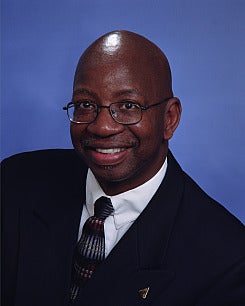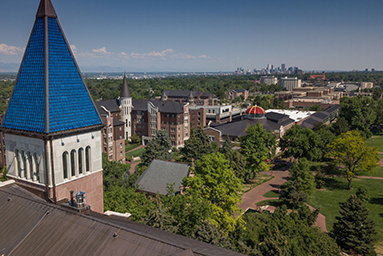Dr. Anthony Young: A Lifetime of Service and Leadership in Psychology
Dr. Anthony Young (PsyD ’90) has built a career defined by perseverance, leadership, and advocacy. His work spans some of the most challenging areas of psychology—maximum-security prisons, mental health hospitals, and juvenile rehabilitation programs—where he has consistently used his expertise to uplift others and advocate for systemic change. As the Graduate School of Professional Psychology (GSPP) at the University of Denver celebrates its 50th anniversary, his story serves as a powerful reminder of the school’s enduring impact.
Unlike many who take years to find their professional calling, Dr. Young knew as early as eighth grade that he wanted to be a psychologist. “I was always an avid reader, and I found out that psychologists help people solve problems,” he recalls. “I had a lot of problems of my own. So, I figured if I became a psychologist, I might be able to solve my own problems—and maybe be worthy to help someone else—that was my motivation.”
After earning his master’s degree in clinical psychology in 1976, Dr. Young spent the next decade gaining hands-on experience in mental health, juvenile justice, and correctional systems before enrolling in what was then called the School of Professional Psychology (SPP) in 1986.
His career took a transformative turn after earning his PsyD. Shortly after graduation, Governor Romer appointed him to the Colorado State Parole Board, recognizing his expertise in corrections and mental health. During this time, Dr. Young often encountered individuals he had previously evaluated as a Clinical Behavioral Specialist for the Colorado Department of Corrections. “Now they were turning up for parole, and I had a better understanding of their condition, having seen their files from earlier evaluations,” he says.
Over the years, he served two terms on the board, including two years as Chair under Governor Hickenlooper, where he introduced evidence-based practices such as motivational interviewing, improving how individuals were evaluated, released, and monitored on parole.
Dr. Young also underscores the psychological toll of working in forensic psychology and other high-stakes clinical settings. His advice to aspiring psychologists: “Your work cannot be all-consuming because it will consume you if you let it.” He encourages professionals to prioritize self-care and cultivate outside interests, helping them navigate the challenges and emotional demands of the field more effectively.
Beyond his work in corrections and forensic psychology, Dr. Young has dedicated much of his life to teaching and mentorship. Over his 26-year tenure as an adjunct professor at the University of Colorado Colorado Springs (UCCS), he made it his mission to connect textbook theories with real-world applications. “My best professors were the ones with real-life experience,” he says. “That’s why I always prioritized sharing real case studies and helping students understand psychology beyond just academic concepts.”
Dr. Young’s commitment to mentorship extended well beyond the classroom. Concerned about the pipeline pushing young men in Colorado’s juvenile justice system into adult prisons, he took action by founding Tutmose Academy, an intensive mentoring program for high-risk youth aged 12 to 18 and its charter high school. More than just an academic institution, the school provided critical life skills, crisis intervention, and a culturally specific curriculum designed to foster self-awareness and resilience. The curriculum combined core subjects with courses in anger management, values clarification, and critical thinking—along with instruction in the Yoruba language to reinforce cultural identity.
The students were court-ordered to participate in the intensive mentoring program as an alternative to juvenile detention, and under Dr. Young’s leadership, the charter school saw remarkable success in reclaiming students who had dropped out or been pushed out of other schools. Ultimately, many Tutmose Academy students outperformed their peers attending local high schools on standardized tests. The school earned the prestigious El Pomar Award for Excellence in 1999.
Though Tutmose Academy eventually closed due to funding constraints, its legacy endures. Dr. Young remains deeply proud of the school’s impact, noting that many former students—and their parents—still express gratitude for how it shaped their futures. Graduates went on to college, the military, or successful careers, escaping the cycle of incarceration. “When I see these same former students living in this community and doing well, that made it all worthwhile,” he reflects.
Dr. Young has long advocated for decolonizing psychology, arguing that many foundational theories were developed within a single, Eurocentric cultural context but presented as universal truths. “Every culture has its own psychology,” he explains. “We may not always call it psychology, but it’s the practice of helping people deal with human challenges.”
He emphasizes the need for psychology to evolve beyond outdated models and embrace cultural groundedness. “We cannot just think outside the box, we need to throw the box away,” he asserts. “The box is a construct—it has its utility, but it’s not universal. We need something that works more effectively.” To truly serve all individuals, interventions must be designed to resonate with diverse communities and align with their cultural experiences. Yet, he remains hopeful: “That’s our challenge as a profession, [but] we have the genius within us [to make these changes].”
As past National President of the Association of Black Psychologists and a Founding Member and current President of the Denver-Rocky Mountain Association of Black Psychologists, Dr. Young has been a vocal advocate for increasing diversity. But he warns that representation alone is not enough. “If we continue teaching the same curriculum, it’s like pouring dirty water into a clean glass.” Psychology must be restructured to reflect broader cultural foundations and made more accessible to students of color through early exposure, mentorship, and community engagement.
Dr. Young reflects on the lasting impact of the Graduate School of Professional Psychology (GSPP) as it approaches its 50th anniversary. Even as a student, he recognized the value of the program, having seen respected colleagues graduate before him. While no school is perfect, he believes GSPP provided a strong return on investment, despite its high cost.
For him, the school’s true legacy lies in the people—his professors and peers—who shaped his experience. He fondly remembers figures like Nelson Jones, one of SPP’s founders and its first dean, whose humor and warmth left a lasting impression. “The legacy is in the people,” he says. He also credits Dr. Joe Dodds and Dr. Evelyn Paley—both co-founders of SPP—as mentors who exemplified dedication and compassion. “SPP was a wonderful experience for me. I had great professors who truly cared about their students—they were good human beings,” he reflects.
At the same time, he acknowledges the lack of diversity among faculty and students, a challenge that reinforced his commitment to cultural competence and advocacy. His time at GSPP not only shaped his professional journey but also strengthened his resolve to push for a more inclusive field of psychology.
Dr. Young emphasizes that lived experiences shape who we are and enhance the impact of a degree. “Wherever you're at, you can make a difference for the better in any capacity you choose to serve in,” he says. His key message for future mental health professionals is simple: growth is always possible, but “we have to have the will” to improve, no matter the circumstances.



